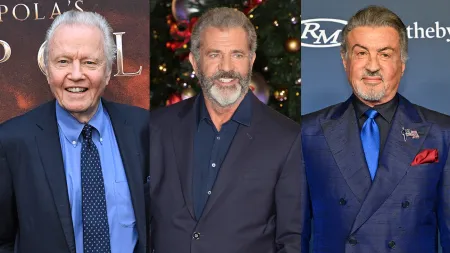President-elect Donald Trump has enlisted Jon Voight, Mel Gibson, and Sylvester Stallone to serve as “special ambassadors” for Hollywood. Their mission? To boost U.S. film and TV production as many Hollywood studios have shifted production overseas due to enticing tax incentives abroad.
Trump shared the announcement on Truth Social, expressing his excitement: “These three very talented people will be my eyes and ears, and I will get done what they suggest. It will again be, like The United States of America itself, The Golden Age of Hollywood!” He added that the goal is to bring Hollywood “BACK—BIGGER, BETTER, AND STRONGER THAN EVER BEFORE,” reversing a trend where productions have flocked to countries like the U.K., Canada, and Australia.
The move highlights Trump’s desire to address the growing concern that Hollywood is losing ground to these international hotspots, which offer generous financial incentives for films and TV shows. Countries like the U.K., for example, have become major destinations for big-budget blockbusters, thanks to favorable tax breaks for filmmakers.
While Trump’s announcement didn’t outline the exact roles Voight, Gibson, and Stallone will play in the push to bring production back to the U.S., it’s likely that their involvement will help advocate for a more favorable tax climate for Hollywood. One potential route could be a federal production tax incentive, something that many industry groups have been pushing for in recent years.
This move comes just as California ramps up its efforts to keep production in Hollywood. Earlier this month, Governor Gavin Newsom signed a budget that dramatically increases the state’s film and TV tax credits from $330 million to $750 million annually. The expansion, set to start in 2025, could offer up to $3.75 billion in credits over the next five years. California’s generous tax incentives now rival Georgia’s, which does not have a cap on the amount it gives to productions each year.
Other countries have been attracting significant Hollywood productions. Last year, films like Jurassic World 4, Mission: Impossible 7, and The Fantastic Four sequel were all shot in the U.K., thanks in part to the country’s attractive rebate system. The U.K. offers rebates on salaries paid to actors like Scarlett Johansson, Tom Cruise, and Daniel Craig, as long as those costs are incurred on British soil. The rebate program can cover up to 80% of eligible production expenses, a key incentive for international films looking to save on costs.
Canada and Australia, meanwhile, have become go-to locations for visual effects and postproduction work, both offering rebates of over 30% for qualifying projects. In response, U.S. states have started to adjust their tax programs to stay competitive, with places like Illinois now including certain types of TV shows, including game shows and reality contests, in their incentives program.
A federal tax incentive could be a game-changer for Hollywood productions. If passed, this incentive could be combined with state-level credits, giving filmmakers even more financial reasons to stay in the U.S. Instead of packing up and heading overseas, productions might find that shooting at home is more affordable and just as rewarding.
With a growing push for more competitive tax credits and a team of Hollywood heavyweights behind him, Trump’s efforts may be the push needed to keep Hollywood’s golden era alive, bringing jobs, revenue, and creativity back to American shores.


